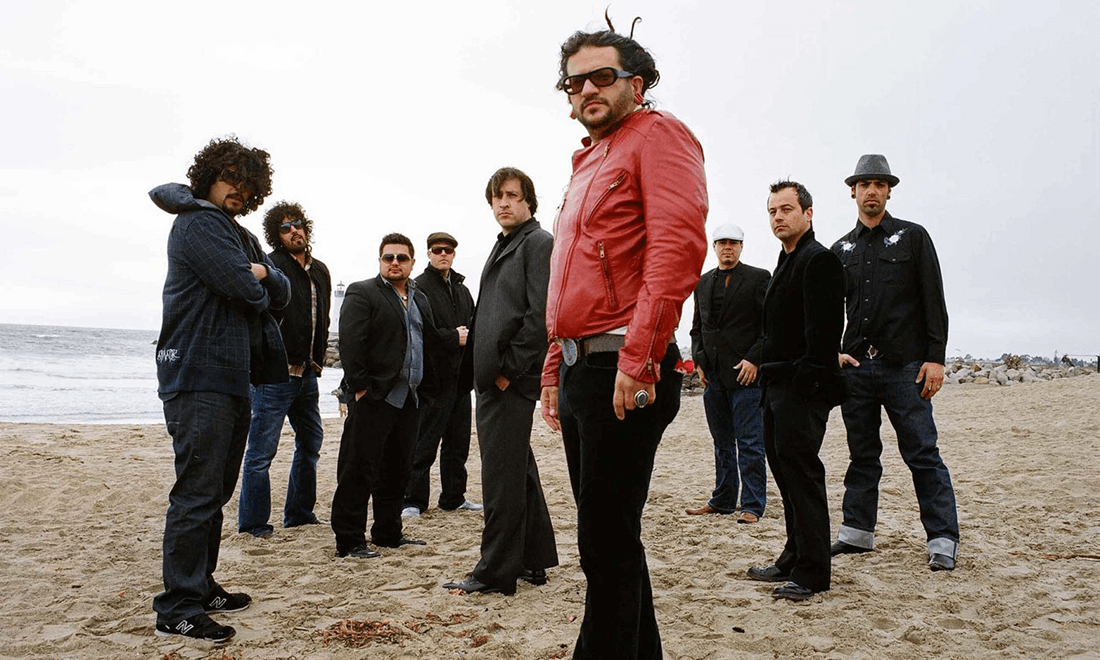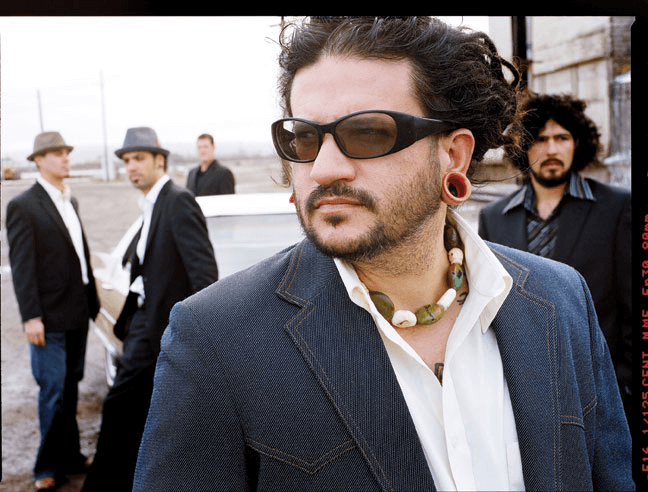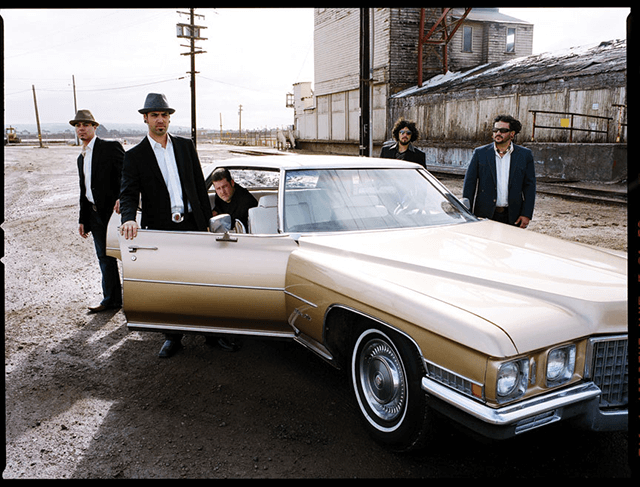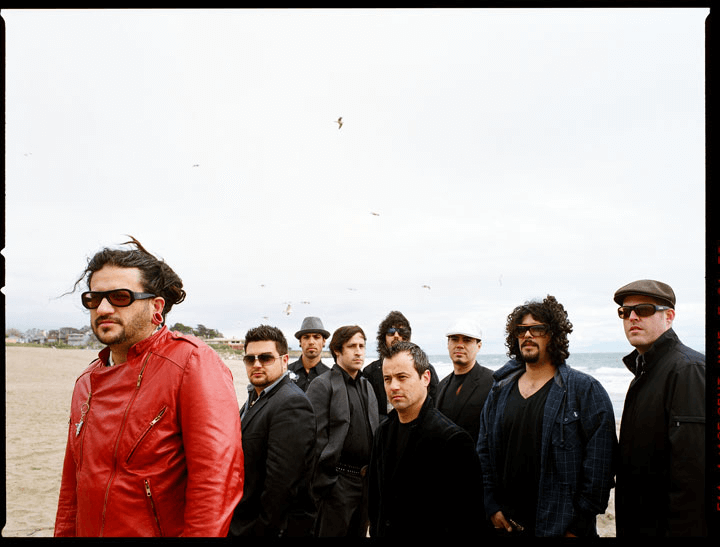
B-SIDE PLAYERS ‘Making a Difference One Song at a Time’
Interview By: Leslie Rae Terhorst
t always amazes me the amount of incredible bands that hail from San Diego. B-Side Players are no exception. With their multi-cultural influences coming through with every note, incorporating the sounds of Cuba, Jamaica, Mexico, Brazil and Puerto Rico mixed in with a little 70’s-funk, rock, reggae, jazz, and hip-hop. The B-Side Players Karlos Paez, Damien DeRobbio, Luis Cuenca, Victor Tapia, Russ Gonzles, and Aldo Perreta are a uniquely eclectic group of talented players, with each member bringing their own passion, and experience to the table, which is evident in every song. I spoke with Karlos Paez (aka) Solrak as he sat in the San Diego Airport heading off to N. Carolina for a show. Karlos Paez, the man behind the B-Side Players, has incorporated his experience of growing up in diverse situations into music that translates to any ethnic background, and can be understood and felt, by all who listen to the lyrics. While he was still in grammar school, Karlos heard the music of Bob Marley, which triggered him into a lifetime of spreading the word of injustice, hope, and humanity to the world.


RIS: There seems to be a huge Latin influence in you style, where does it come from?
SOLRAK: We always incorporate in Latin with the Afro-Cuban, or the jazz or funk. Most of us are Latino that’s what the B in B-Side Players stands for, Brown Side, we all come from mexico.
RIS: Since you started back in 94’, how would you say in your opinion has music/people changed since then?
SOLRAK: Well, music in general has changed, it has become more of a multi-cultural world. The business has changed in the fact that musicians are more independent these days. You don’t have to have the dream of getting a record deal anymore, that’s kind of been shattered recently. Because, a record deal doesn’t have anything to offer you anymore, all you’re going to do is put yourself into dept. So musicians have become more independent, and are pushing there own music. Therefore, they are being more creative, that’s because they don’t have these record labels to mold their sound, and redirect them into a form of music they think it should be. That’s one thing we’ve been blessed with, and how we’ve been able to survive as an independent band, without the support of television, radio, or the support of record labels. That’s why we are still here, we’ve learned how to survive the hard way, we learned how to survive from the roots, from being independent, and just going out and touring and funding our own music, that’s why we are still around after 15 years.
RIS: You put a lot of your heart, soul, and passions into the music. Where does all this inspiration come from?
SOLRAK: The inspiration come from everywhere. My environment growing up has always been border town Tijuana, from San Diego, to Tecate, and to Los Angeles. I’ve always been like the little border kid going back and forth. I witnessed a lot of different types of culture. A lot of mexican family style culture, and at the same time I witnessed a lot of injustice, such as immigration and the corruption in Tijuana. Now that it’s been exposed, and everyone knows about the murders and police corruption, it has always been this way in Mexico. It’s a 3rd world country, with 3rd world corruption, and 3rd world murders. I grew up with that, and one of the most important lessons I learned, is just knowing how to live with it, and not let it put fear into you, and just try to grow up normal. Just coming over to the U.S. when I was young and not speaking English, and being the minority, there were only 3 mexicans and one black kid in my class. To now with my kids being in a room full of all mexican kids and only 2 white kids. I’ve seen the change of the minority becoming the majority, and how the whole Southern California style has changed. Inspiration come from all around, it comes from also traveling. The B-Side Players gave me the privilege to travel for over 12 years. From a National touring band, and going all through Mexico. It’s important to me to see the way other people live, because every time you cross that border state there is a whole different way of living. I’ve learned to build a fan base with these different cultures, and different people all through out the United States.
RIS: We’ve kind of taken a break from going down into Mexico, what are your thoughts on the situation?
SOLRAK: It’s really dangerous right now. It’s not that the media is trying to put fear into everybody, it is really dangerous down there. It’s not a safe place, and hopefully it will get better. But as far as Tijuana, that’s one of the most dangerous cities in the world, and people don’t really talk about that, but that’s where I grew up, and that’s where some of my family is from. I sing a lot about immigration rights and police brutality, and that comes out in the lyrics. I grew up listing to Reggae, and reggae being a protest music of the Jamaicans and of the whole Caribbean culture, it kind of set something in my mind and my heart growing up, because I knew there was a struggle out there, so when I started knowing of my people struggling it forced me to start writing about it, and express myself lyrically.
RIS: You stated with the release of ‘Fire in the Youth’ that “we want our sound to continue to grow until we represent the entire range of Latin music”. Do you feel you have achieved this goal?
SOLRAK: Yes, but I’m still learning different rhythms. It’s a process, and I’m not there yet. Have I mastered Latin music, I don’t think I ever will. We do a good job as far as incorporating different styles. Our records contain Cumbia from Colombia, and there will be some Bomba rhythms from Puerto Rico, and there will be some Salsa from Cuba, and there would be some Jarocho from the Mexican culture, it’s just studying and incorporating what we’ve learned and putting it in the B-Side sound. The B-Side sound is that chicano kind of latin 70’s groove, that’s kind of the foundation, the base. But then we mixed these other new rhythms, and different cultural sounds that we have learned. It’s something that I haven’t mastered, and I probably never will. I like learning new things, that’s what makes it fun, I look at it like I’m going to school, and once you stop learning you just curl up into a ball, learning is what gives us purpose and keeps me going.
RIS: This is our Green Issue, what are you doing personally to help with the Global Situation?
SOLRAK: I’m driving a hybrid right now, and that’s Green. We travel so much, and put so much fuel into our tanks, I think that the B-Side Players pretty much funded a whole year of the war. We just waste so much money on fuel, it just kills me. It’s what made me get into the whole Hybrid thing, and also just educating my kids and making them conscious about the environment, because ultimately they are the ones that are going to pay for all the damage we did. So just education, and raising consciousness through our songs.
RIS: This might be a pretty heavy question, but, if you could change on thing in this world what would it be?
SOLRAK: I would make music mandatory in all the education system, make it just as important as any other subject. I think music is an element, it’s just as important as earth, wind, fire, and water. Dancing, music, and art is something that I had to go find myself, I know there are people out there that have it in them, and never get a chance to come across it. In other countries it’s everywhere, it’s in the streets, in the super markets, it’s just a way of life. I feel like in the United States it is not around as much. Especially in the education system it’s usually the first thing that gets cut from the schools, but what they don’t realize is how much it helps out kids, with their math and social skills, and their future life skills. It gives them confidence, and peace.



